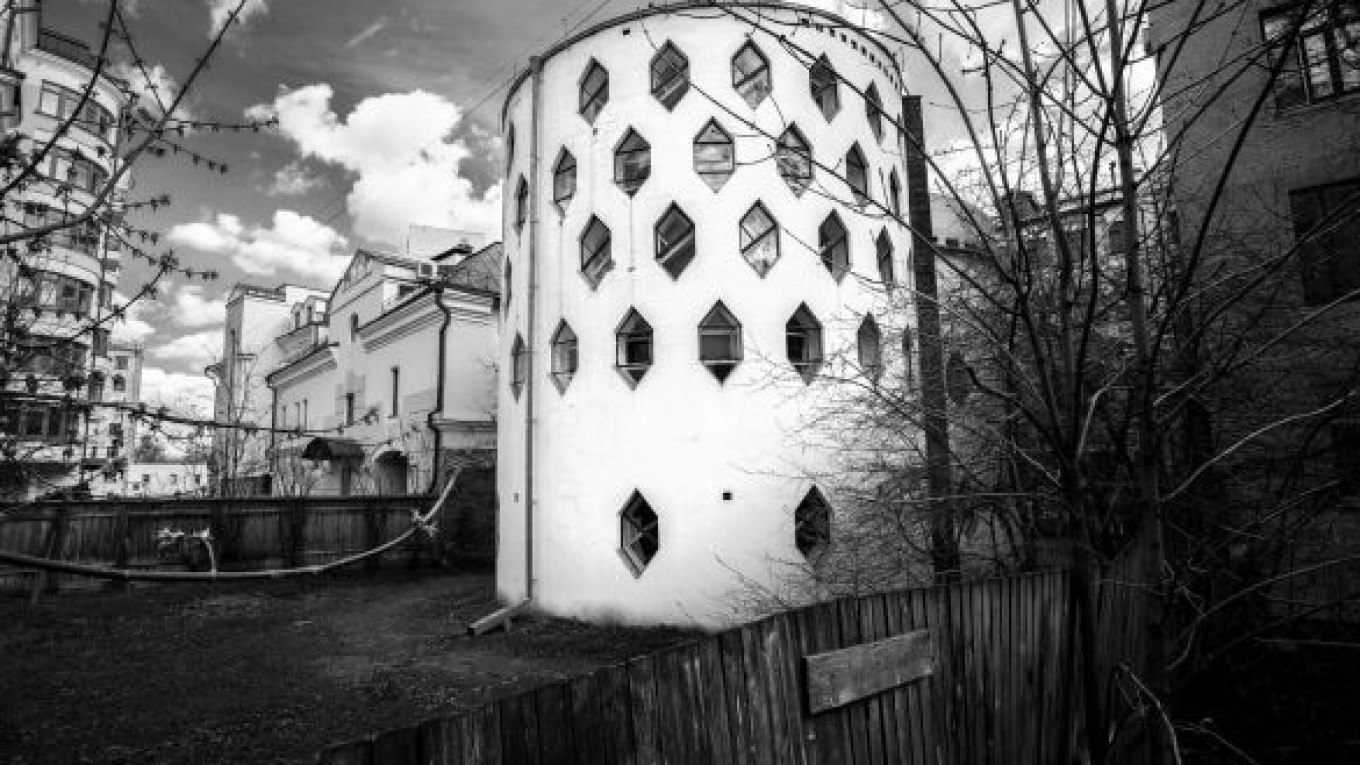Just steps away from the matryoshka-strewn Old Arbat, where tacky trinkets offer a shallow slice of Russian culture to go, an object of genuine cultural significance is on the brink of destruction.
Builders are at work on a multifunctional center with three levels of underground parking, in the process, experts say, endangering a celebrated gem of the Russian avant-garde.
The Melnikov House on Krivoarbatsky Pereulok is utterly original. Formed from two intersecting cylinders with over 60 diamond-shaped windows, the house eschews typical horizontal space in favor of a steady spiral upwards: from basic needs on the ground floor, to sleeping and living rooms on the second, to creation in the form of a lofty, radiant studio on the third.
Built as a model for mass housing in 1929, the house soon became a refuge for its pioneering designer, Konstantin Melnikov, when Stalinism's conservative turn in the early '30s left the architect unable to teach or practice his craft. Yet even now the unique structure still has an uncertain future.
Its condition is visibly deteriorating: old cracks have widened, new ones have appeared, the soil is sinking, and the cylinders themselves are even beginning to separate.
The developer, Trust-Oil, has blamed this decline on the house's age, but the government actually paid for expert restoration during the '90s. Unfortunately, the 15 years of rapid urban growth that followed surrounded the property with concrete walls, directing groundwater towards the house's foundation. A 2006 report found that any nearby construction, including Trust Oil's proposal, was liable to damage the monument.
Yekaterina Karinskaya, Melnikov's granddaughter and resident of the house, thinks the path is clear. "First, stop the construction. Conduct an independent evaluation. Get a verdict as to why the earth is sinking, why the foundation is sinking, and then get recommendations on how to fight this," Karinskaya said. Concern has spread beyond Moscow.
The International Council on Monuments and Sites (ICOMOS) issued a Heritage Alert in April advising precisely this program as the first step in a long-term agenda for the monument.
According to Natalia Dushkina, vice-president of the committee, ICOMOS alerts typically result in a decisive state response. "They understand that it turns into a certain political problem, not just cultural," Dushkina explained.
"But in our situation, once again, no one received an answer," she said. Letters from both Russian and international organizations have met the same silence.
The Moscow Department of Cultural Heritage asserts that, although half of the monument belongs to the city, it cannot commit government resources to restoration or establishing a museum so long as the other half remains the subject of a lawsuit. The lawsuit in question, a dispute between Melnikov's grandchildren, has long been the focus of media and government attention.
Now, in light of the house's condition, preservationists believe it is time to redirect the conversation. "There will be nowhere to put a museum if the house starts falling apart," Dushkina said.
The Shchusev State Museum of Architecture, which holds operational control over the city's share of the building, has launched a two-pronged campaign to draw attention to the building's plight. In addition to gathering over 7000 signatures on an open letter to Mayor Sergei Sobyanin, the museum recently held a competition to solicit possible designs for the future Melnikov Museum.
"We decided that we had to hold this competition partly to attract the attention of society and also to determine a future course of action with a pool of potential architects who could be called to work," said museum director Irina Korobina.
The winners were announced Tuesday last week with first prize going to Citizenstudio and Nina Fyodorovna for their concept, "Slippers for the Melnikov Museum." Realizing that the upper levels of the house have been preserved as they were during the time of the architect and his son, artist Viktor Melnikov, the collaborators declared: "The Melnikov Museum already exists." All that is needed, they believe, is physical restoration and slippers for the museum's guests.
The Melnikov House is just one among many neglected avant-garde structures in Moscow. Their predicament inspired photographer Natalia Melikova to launch The Constructivist Project last year, a website and blog aiming to introduce these buildings and their precarious condition to a wider audience.
"I love to have people not only look at beautiful pictures of the buildings but also see when they're just falling apart," Melikova said, mentioning the Melnikov House, El Lissitzky's "Ogonyok" Printing Plant, Shukhov Tower, and Ginzburg's Narkomfin Building as especially at risk.
The early years of the Soviet Union saw a flowering of innovative, radical architecture aspiring to restructure everyday life itself. Some of the buildings have been reborn into the new era, such as Melnikov and Vladimir Shukhov's Bakhmetevsky Bus Garage, which now houses Moscow's Jewish Museum of Tolerance. But it remains to be seen whether further avant-garde landmarks will find a safe space on the volatile landscape of modern Moscow.
Contact the author at [email protected]
A Message from The Moscow Times:
Dear readers,
We are facing unprecedented challenges. Russia's Prosecutor General's Office has designated The Moscow Times as an "undesirable" organization, criminalizing our work and putting our staff at risk of prosecution. This follows our earlier unjust labeling as a "foreign agent."
These actions are direct attempts to silence independent journalism in Russia. The authorities claim our work "discredits the decisions of the Russian leadership." We see things differently: we strive to provide accurate, unbiased reporting on Russia.
We, the journalists of The Moscow Times, refuse to be silenced. But to continue our work, we need your help.
Your support, no matter how small, makes a world of difference. If you can, please support us monthly starting from just $2. It's quick to set up, and every contribution makes a significant impact.
By supporting The Moscow Times, you're defending open, independent journalism in the face of repression. Thank you for standing with us.
Remind me later.






